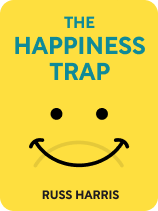

This article is an excerpt from the Shortform book guide to "The Happiness Trap" by Russ Harris. Shortform has the world's best summaries and analyses of books you should be reading.
Like this article? Sign up for a free trial here .
What are values in ACT? How do values differ from goals?
In Acceptance and Commitment Therapy (aka ACT), values are the principles that govern how you want to act. Unlike goals, values are never accomplished. Rather, values involve continuous behavior—they guide your choices and decisions according to the kind of person you strive to be.
Keep reading to learn about the ACT method for clarifying your values.
Values vs. Goals
We don’t necessarily choose our values. Instead, we develop them throughout our lifetime in response to the problems we face and how we choose to resolve them. Even though we may not be able to choose our values, we can identify them.
A value involves continuous behavior. For instance, “I want to treat my family with respect” is a value, because the behavior associated with the value must be ongoing in order to satisfy the conditions of the value. It’s not sufficient to take one respectful action toward your family and call it quits. Rather, your treatment of your family must be consistently respectful in order to satisfy this value.
By contrast, Harris notes, a goal is an objective we set for ourselves that can be fully completed. For instance, “I want to get married” is a goal, not a value, because after we get married, that has been achieved.
| Values vs. Beliefs Besides making a distinction between values and goals, it’s also important to recognize that there’s a difference between values and beliefs (even though the two categories are related). In general, values concern your individual behavior, whereas beliefs are general statements of conviction that we accept as true. For instance, the statement “lying is bad” is a belief, whereas the statement “I want to be honest” is a value. As you can see, values can often be derived from our beliefs. So, as you work on clarifying your values, keep your strongly held beliefs in mind. They may guide you to values that would otherwise go unnoticed. |
Harris argues that Western societies are goal-oriented: We tend to pay a lot of attention to our status and achievements, particularly the concept of success. For instance, here are some typical goals in Western societies:
- Get an education.
- Get married.
- Get a good job.
- Have children.
- Make a certain amount of money.
However, this goal-oriented lifestyle often pushes us to pursue goals that don’t align with our values. For instance, somebody who works 80-hour weeks with the goal of making a lot of money may not have put much thought into why they want money. If one of their values is to spend time with family, their heavy work schedule conflicts with that value. This makes them unhappy because they’re working hard to achieve a goal that doesn’t satisfy their values.
Furthermore, Harris notes that goals that don’t align with our values can escalate. For instance, let’s say that somebody has the goal of earning $100,000 a year. They achieve this goal, but very quickly learn to spend within their newfound means. Suddenly, their goal becomes to make $150,000 a year. Because the amount of money that the person wants to make isn’t tied to their values, there is no end to this pattern of escalation. When we believe that these goals will eliminate negative thoughts and feelings, we get caught in the happiness trap.
By contrast, ACT promotes a values-oriented approach to life. This doesn’t mean that we stop setting goals, but rather that we set our goals in accordance with our values. When we set our goals in accordance with our values, those goals become ends unto themselves, not merely stepping stones toward something else.
| An Alternative Definition of Values In Awaken the Giant Within, Tony Robbins describes a similar conflict using the terms “ends values” and “means values.” He writes that your ends values are the emotional states you want to experience, such as love and security, and the means values are the ways you expect to reach the ends. Like Harris, Robbins argues that if you don’t identify your ends values, you could waste your time pursuing means values without ever achieving their ends. Although it seems like a simple difference in terms—that Harris would classify ends values as values and means values as goals—the distinction is more nuanced. Harris distinguishes between values and goals in terms of action: A goal requires an achievable action, while a value demands an ongoing behavior. By contrast, Robbins’s definition of an ends value is not something you do, but an emotional state you experience. |
Living according to your values is intrinsically satisfying, according to ACT. Values enable us to endure the typical suffering of human existence because they give us a point of connection to our lives, even when everything else seems hopeless. For instance, consider the example of someone living in extreme poverty. If they value treating others with kindness, that value guides their behavior—even when they’re in situations where unkindness might seem easier, or more convenient, than kindness.
Values also enable us to work hard when we feel we’re contributing to something we value. For example, consider our previous example of a person working 80 hours a week: They may burn out quickly if they’re not working toward a clear set of values, but they can take the work in stride if they know their work satisfies a value like providing a good life for their children.
How to Clarify Your Values
Now that we have defined values, you need to determine your own values.
In this section, Harris shares an exercise derived from the work of psychologists Kelly Wilson and Tobias Lundgren to clarify values in four domains:
- Relationships
- Education and work
- Personal development and wellness
- Leisure
As you work through this exercise, remember that values are:
- Continuous—Unlike goals, they cannot be completed.
- Action-oriented—They concern how you want to behave, not the end result of that behavior. For instance, “I want to feel happy” is not a value, because happiness is a feeling, not a behavior.
- Focused on you—You can only control your own actions, so values are principles that govern how you want to behave in the world. For instance, “I want to be popular” is not a value, because you can’t control whether people like you.
| Don’t Just Identify Your Values—Choose Them In Awaken the Giant Within, Tony Robbins asserts that most people adopt values unconsciously, based on their life experiences and conditioning from family, friends, and society. While many of these values are virtuous, some may conflict with your goals. He argues that being unaware of your values—which guide your behavior—often leads to disappointment and frustration as you pursue your goals. To take control of your life, Robbins says you must consciously choose your values. He suggests you first take stock of the values you hold and how you prioritize them—for example, you may value success over passion, and that causes you to behave differently than if the opposite were true. Next, reflect on what type of person you want to be and what type of life you want to live. Finally, eliminate values that don’t serve that vision, adopt values that do, and prioritize them to align with your goals. While Harris’s exercise focuses on identifying—rather than choosing—your values, it may still help to consider Robbins’s point that you could be unconsciously carrying values that need to be identified, reprioritized, or eliminated to allow you to achieve the life you want. |
Domain #1: Relationships
Reflect on the values that govern all of your relationships—with your family, your romantic partner, your friends, and your associates.
Harris suggests asking yourself the following questions:
- What kinds of relationships are important to you? For instance, do you deeply value your romantic attachments or consider family bonds to be important?
- What kinds of actions do you want to take in your relationships? For example, do you want to be assertive, kind, or a source of comfort in your relationships?
- What sort of person do you want to be? For instance, do you want to be loving, strong, stoic, or empathetic?
- If you could be exactly the person that you want to be, with no obstacles in your way, how would you behave toward other people? For example, would you be generous if you had more money, or more honest with others if you weren’t afraid that they wouldn’t like you?
- What sorts of things do you want to do with the people you know? For instance, do you want to hike with your spouse, visit your parents for dinner, or read to your children?
Harris cautions not to focus on the qualities of the people you want to build relationships with, but rather on your desires and behavior. Instead of imagining an ideal spouse, think about how you would want to behave if you did find your dream spouse.
| Another Strategy to Clarify Relationship Values In Minimalism, Joshua Millburn and Ryan Nicodemus take a different approach to identifying your relationship values. In contrast to Harris’s method, Millburn and Nicodemus recommend developing a broad “vision” of the types of relationships you want to build, and then using that to zero in on your values. To do this, ask yourself these three questions: What do you want? Compile a list of the things you want in your primary relationships. Then ask yourself how you contribute to the things you want. For example, if you want honesty in your relationships, honesty is likely one of your values. What are your deal-breakers? List the things you can’t (or won’t) tolerate in your relationships. Then, ask yourself how you can behave to avoid those deal-breakers. For example, identifying dishonesty as a deal-breaker is another way to recognize that honesty is one of your values. How must you change to attract these kinds of people? We can’t choose all of our relationships, like parents and children, but we play a role in attracting our friends and romantic partners. Imagine the sorts of people you want to be around, then identify the values you’d like to exemplify in that company. For instance, if you want supportive friends, then being a supportive friend may be one of your core values. |
Domain #2: Work and Education
Harris offers the following questions to identify values related to your personal career, professional relationships, and ongoing education (both formal and informal):
- What sort of person do you want to be at school or work? For example, do you want to be studious at school, or kind to your coworkers?
- If you could be exactly the person that you want to be, with no obstacles, how would you treat people at work or school? For instance, would you be kind to customers if you weren’t constantly annoyed, or would you help your classmates if you knew the class material well enough?
- What kinds of work- or school-related relationships are important to you? For instance, are you interested in becoming friends with your coworkers, or in developing mentor/mentee relationships at school?
- What skill or knowledge would you like to learn? For example, do you want to learn woodworking, or develop financial literacy?
When answering these questions, remember the difference between goals and values. For instance, saying, “I want to be an architect” is a goal. Instead, focus on the qualities you’d like to bring to your career or school work—such as being attentive and diligent.
| Another Strategy to Clarify Work and Education Values While Harris’s questions focus on your aspirations, you use these four additional questions to clarify your work and education values based on your past experiences: What is your proudest professional moment? Then, examine the reasons you felt proud. If you delivered a particularly difficult project, then challenging yourself might be one of your values. Why did you choose your career or major in school? Figuring out your motivation is a good way to uncover your personal values. For example, some people become doctors because they want to help people, and others want to make enough money to provide for their families. What is a moment when your perspective on your work changed, positively or negatively? For example, if your perspective shifted when your boss called you replaceable, you may value having a skill that few people can do. Who has been one of your mentors, and how have they changed your life? Think back on the people who have influenced you and see if there are any values that they hold that you share. |
Domain #3: Personal Development and Wellness
In this domain, Harris focuses on the aspects of your life that contribute to your physical health, your emotional and mental welfare, and your personal development.
Ask yourself the following questions:
- What kinds of healthy pursuits would you like to start or revisit? For instance, do you want to go to therapy, take up meditation, or start running again?
- What organizations would you like to be affiliated with? For example, do you want to join a volunteer organization that feeds the homeless, or a citizens group addressing climate change? (Shortform note: Jack Canfield’s The Success Principles offers some guidance with this question. Ask yourself: Which organization’s work do you admire? What causes, issues, or people are important to you?)
- What changes do you want to make in your life to promote your personal health? For instance, do you want to exercise more or quit smoking or drinking alcohol?
| Extract Your Values From Personal Goals Personal development and wellness are often the focus of New Year’s Resolutions. Although resolutions are typically viewed as goals, author and life coach Susanna Newsonen recommends three questions to help clarify the values that underlie these kinds of yearly commitments: What are three enjoyable things that you’d like to do more of in your life? By identifying the things that we enjoy doing, we’re not only enriching our lives by filling them with more pleasurable things, but also clarifying our values: The principles that govern how we want to act. What are three ways that you’d like to grow? We feel happy and satisfied when we’re growing—and identifying how we want to grow can highlight the underlying values that will fulfill us. This question applies directly to the concept of personal development in The Happiness Trap. What are three things that you’d like to do less of? Remember that we consider our values from the viewpoint that anything is possible. Even if cutting down or eliminating cigarettes feels impossible, the desire to smoke less can help you recognize that you value smoking less to benefit your health. |
Domain #4: Leisure
This domain concerns what you do for fun, your hobbies and interests, and other ways you pursue leisure. (Shortform note: If you live in a culture that prioritizes work and productivity, it may seem strange to see leisure listed as a category of values. But rest and relaxation are important elements of an enriching life.)
Harris suggests asking yourself the following questions:
- What kinds of interests do you want to start or revisit? For example, do you want to start writing short stories, or pick up recreational soccer again?
- How would you like to spend your leisure time in healthy and enriching ways? For instance, do you like to go on nature walks, or do you want to learn how to swim backstroke?
- What are some leisure activities that you would like to do more of? For instance, instead of reading a book every few months, would you like to read one book a month?
(Shortform note: Not only do some cultures emphasize leisure more than others, but the type of leisure they prioritize also varies. For example, in a study of 18 countries, the French spent the most time eating, drinking, and sleeping, and Turks spent the most time entertaining friends.)
| Identify Your Universal Values In general, values fall into one of three categories: 1) Personal—the kind of person you are, your personal desires, and how you think 2) Social—how you treat other people 3) Universal—how you interface with culture, spirituality, and the “big picture” While Harris’s questionnaire focuses on your personal and social values, other questionnaires, such as the Life Values Inventory, can help you identify universal values. This inventory lists values and asks you to rank each on a scale of 1 to 5 (1 signifying that the value never guides your behavior and 5 signifying that it always does). Then, you add up your answers from specific questions to get an overall score for each universal value. For instance, you may find that you value scientific understanding, which means that you generally believe that science and scientific principles are important to understand the world and solve problems within it. It would be difficult to reach this value using only the questionnaire Harris provides in The Happiness Trap, but understanding these types of values can still help you achieve the goal of ACT: to consistently act in a way that aligns with your values, without being deterred by difficult emotions. No questionnaire will perfectly define your values (personal, social, or universal) because no single questionnaire can adequately address the complexity of life. Instead, you can pull from different inventories to get a fuller sense of your values. |
Common Concerns About Values
As you worked to clarify your values in the last section, you may have encountered some difficulties. Harris identifies some common problems you might have faced, and he offers some solutions:
1. I don’t know what values to choose.
Keep in mind that we don’t necessarily choose our values; we identify them. But if you’re struggling to identify your values, try imagining a fictional character who embodies all of the best values a person can have. The values you choose for this fictional character are the values that are important to you.
(Shortform note: Alternatively, think about the people you admire in the world, whether in your personal life or in the broader culture. What values do you imagine they hold? You admire these people for a reason—if you identify a value that you think they hold, it’s probably important to you, too.)
2. I’ve assembled a list of values, but I’m not sure I actually believe in them.
Imagine a world where you had the unconditional support of every person in your life. How would you behave? What sorts of things would be important to you? This thought experiment removes the component of other people’s reactions and judgments from the equation and allows you to see if your values are actually your own.
(Shortform note: Alternatively, envision someone who holds your stated values. Do you admire them? Do you wish they were different in some way? If so, how so? If you admire this person, the values you’ve identified are likely your own. If you think they should be different, your list of values may not be entirely accurate.)
3. I feel like I’m setting myself up for failure.
It’s understandable to worry that you won’t be able to live up to your values. However, these worries are just thoughts—practice your defusion skills on these thoughts and keep moving forward.
(Shortform note: Harris doesn’t explicitly mention this here, but it’s worth remembering that, in ACT, living according to your values is intrinsically satisfying. You may worry that your values translate into unrealistic goals, but striving to live by those values can still be enriching and meaningful.)
4. Some of my values contradict each other.
It’s natural that our values will conflict occasionally. For instance, you may value both going above and beyond in the workplace and being a kind and present spouse. In practice, there may be times when going above and beyond at work means that you can’t be with your spouse as much as you’d like.
To minimize these conflicts, go back through your values and assess:
- Which are the most important to you
- Which are the most urgent for you to practice
Then, when conflicts arise, you know where you stand.
However, at other times, the best solution may be a productive compromise. For example, decide that you can go above and beyond at work within ordinary working hours so that you still have time to go home and be a kind and present spouse.
| Prioritize Your Values In Awaken the Giant Within, Tony Robbins similarly acknowledges that values can conflict, and he suggests a method for prioritizing your values: Think of the values you would need in order to be the best person you could be and live the best life you could. Consider where your values sit in a hierarchy. Ask yourself which values you can eliminate from your priority list. If you already achieved a value like love or security, Robbins says that you can remove it from your hierarchy. (This conflicts with Harris’s definition of values as ongoing behaviors rather than achievable goals.)Look at each value on your list and assess its benefits and drawbacks. What do you gain by putting one value over another? What do you lose? Based on your analysis, reassess the priority order of your values. |

———End of Preview———
Like what you just read? Read the rest of the world's best book summary and analysis of Russ Harris's "The Happiness Trap" at Shortform .
Here's what you'll find in our full The Happiness Trap summary :
- Why trying to be happy is making you unhappy
- How to practice ACT, or Acceptance and Commitment Therapy, to become happier
- How to develop “psychological flexibility” toward negative feelings instead of eliminating them






